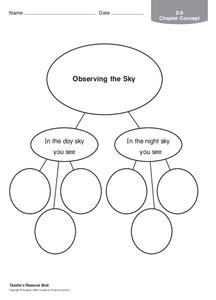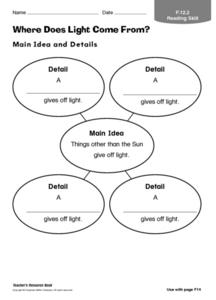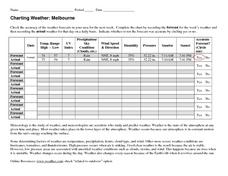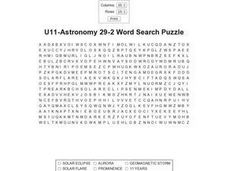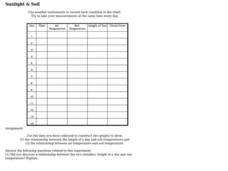Curated OER
What Stars Can You See?
In this stars worksheet, students will fill in the blank of 4 fact statements about the sun and 4 fact statements about other stars in the sky.
Curated OER
What Causes Day and Night?
In this day and night instructional activity, students will that day and night are caused by the Earth's rotation on its axis and that the sun shines on different parts of the Earth. This instructional activity has 4 fill in the blank...
Curated OER
What Can You See in the Sky?
In this objects in the sky activity, students will compare what they can see in the sky during the day and during the night. Students will complete 8 fill in the blank statements.
Curated OER
Observing the Sky
In this sky worksheet, students will write down 3 things they see in the sky during the day and 3 things they see in the sky at night. This worksheet is a graphic organizer.
Curated OER
Energy Flow in a Food Chain
In this energy flow worksheet, students will fill in the 3 steps that energy flows through a food chain after it leaves the sun.
Curated OER
How Does Energy Flow in a Food Web?
In this food web worksheet, students will write down the 4 steps energy takes as it flows through a food chain. This worksheet is a graphic organizer.
Curated OER
How Do Plants and Animals Get Energy?
In this food chain worksheet, students will determine where plants and animals get their energy by filling in the blank of 4 statements.
Curated OER
Where Does Heat Come From?
In this heat worksheet, students will brainstorm objects that give off heat. Then students will complete the statement "Heat can make things __________."
Curated OER
Where Does Light Come From?
In this light worksheet, students will brainstorm 4 different objects that give off light, other than the sun. Students will put their ideas into a graphic organizer.
Curated OER
Earth
In this Earth instructional activity, learners respond to 5 different questions related to the Earth and its atmosphere. First, they determine the distance from Earth to the Sun and the distance across Earth. Then, students explain how...
Curated OER
What is Weather?
In this weather learning exercise, students photograph and record the weather conditions for a week. Then they list the types of clouds observed and the weather conditions they noted associated with each cloud type. Students also write a...
Curated OER
Charting Weather: Melbourne
In this earth science worksheet, students check the accuracy of the weather forecasts in their area for a week. Then they complete the chart by recording the forecast for the week's weather and then recording the actual weather for that...
Curated OER
Weather Calendar
In this weather calendar worksheet, students read the calendar and identify the type of weather that occurred on that date. They also determine the total number of days that were cloudy, sunny, etc. There are 9 questions on this...
Curated OER
Astronomy 29-2 Word Search
In this science worksheet, students locate and identify various vocabulary terms related to space science. There are 9 words/phrases located in the puzzle.
Curated OER
The Sundial of Space Exploration
In this science worksheet, students engage in the process of using a sundial to tell the time in various places. The sundial is meant to be cut out.
Curated OER
Sunspot Activity
In this space science worksheet, students find the data that is needed to help them acquire the knowledge concerning sunspots through observation and data collection.
Curated OER
Sunlight & Soil
In this earth science worksheet on sunlight and soil, learners use data collected in a chart to construct two graphs. Following, they answer five questions as they relate to the experiment performed.
Curated OER
How Big Are Earth, Sun, and Moon?
Third graders draw what they believe is in space on a dry erase board. In groups, they are given a beaker half filled with water and they add a teaspoon of oil, observing the different layers that form. To end the lesson, they identify...
Curated OER
Space: Stars and Planets
Students observe and report that the moon can be seen sometimes at night and sometimes during the day. They describe how changes to a model can help predict how the real thing can be altered. Students explain the essential fact of the...
Curated OER
The Night Sky
Third graders develop questions they have about the solar system. After being read a book, they view and discuss different constellations in the sky. In groups, they are given a piece of butcher paper and glow in the dark crayons in...
Curated OER
Reasons for Seasons
Young scholars investigate a model of the tilt of the Earth in its relationship to the Sun during the different seasons of the year. They study the solstices and equinoxes, while determining how sunlight hits the Earth with different...
Curated OER
Moon Phases, Day/Night
Fifth graders observe a demonstration that shows how the alignment of the sun, moon, earth relate to the phases of the moon that occur each month. They describe the moon's phases after experimenting in a small group setting and recording...
Curated OER
Night Sky
Young scholars discover why stars can only be seen at night. They participate in a read aloud of, "Night Sky" by Carole Stott and, "Switch on the Night" by Ray Bradbury. Using the sky objects described in the readings, they brainstorm...
Curated OER
Snow Goggles And Limiting Sunlight
Students investigate the effects of light radiation on the human eyes. They construct a pair of snow goggles that are used to see how a filter can protect the eyes from radiation. Then students explain how the scientific method can be...





